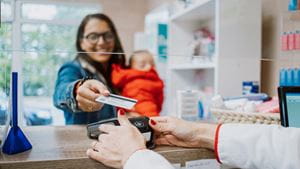
An FSA is an account used to pay for out-of-pocket eligible health care expenses on a pre-tax basis. These accounts are set up as part of a health plan and can help to offset costs such as copayments, coinsurance, and deductibles. This money can often be used for medical, prescription, dental, and vision expenses.
The biggest benefit of an FSA is the money that individuals contribute to the account is not taxable and the funds are frontloaded.
For 2024, individuals can contribute up to $3,200 to their healthcare FSA. All money contributed to an FSA over the course of a calendar year must be spent by the end of the year, otherwise it will be lost.
Individuals may receive an FSA debit card to use toward FSA-eligible expenses. Reimbursement claim forms can be filed for qualified expenses; FSA administrators may require individuals to submit paper receipts for eligible expenses.
For individuals who may have available funds that need be spent by the end of the year, the funds need to meet certain criteria to be spent. The IRS maintains a list of eligibility requirements for expenses that can qualify for healthcare FSA spending.
Below is a list of some healthcare FSA-eligible items in different price ranges.
Band-Aids: This may be surprising, but adhesive bandages do fall under the medical expense category. If there is a small amount of money available in a healthcare FSA for the rest of the year, consider buying a package or two.
Feminine hygiene products: Pads, liners, and tampons all qualify as FSA-eligible expenses. The end of the year is a good chance to stock up if you need to.
Pain relievers: Over-the-counter pain medications such as Aleve, Tylenol, and generic versions of the drugs are available for purchase through FSA funds.
Allergy medication: There’s no better way to prepare for spring than to pick up a package of allergy pills. Zyrtec, Claritin, and other brands all offer relief from seasonal allergy symptoms.
Sunscreen: Protecting your skin from sun damage is always in style. There are plenty of brands to choose from, including Supergoop!, Sun Bun, Banana Boat, and more - just be sure to pick one with proper SPF coverage.
Blood pressure monitor: A great way to monitor day-to-day health, a blood pressure monitor can be helpful for those with hypertension, high cholesterol, or other health conditions.
TytoCare Medical Exam Kit: This hand-held examination kit is linked to an app that lets health care providers guide patients through medical exams no matter where they are. During virtual health visits, this kit can help to better diagnose illnesses.
Walker: If you or a family member is in need of assistance walking, having a walker can come in handy. Wheel walking rollators are sold with and without seats, and fold nicely for easy storage and transportation.
Eye care products: For those with vision needs, available FSA funds can be used for pay for eyeglasses, sunglasses, contact lenses, frames, and other eye care items.
Oura Ring: Ideal for tracking sleep, heart rate, oxygen levels, daily steps and more, this Bluetooth-enabled ring can track your health data for you without any bulky wires or over-the-top accessories.
Varicose vein treatments: Modern minimally invasive procedures to reduce and remove varicose veins are safer and more effective than ever before. The cost varies by patient insurance plan, so individuals should call the Vein Treatment Center office at (585) 922-VEIN (8346) for an estimate or to ask any questions.
Purchases of various health products and services can be made in person, as well as online. The FSA Store offers a range of FSA-eligible items for sale on its website.
For those who may have questions about eligibility, annual employer contribution limits, healthcare FSA reimbursement employer contributions, or whether their private insurance provider allows an FSA rollover, contact your human resources department and ask to speak about your employer’s FSA benefits.